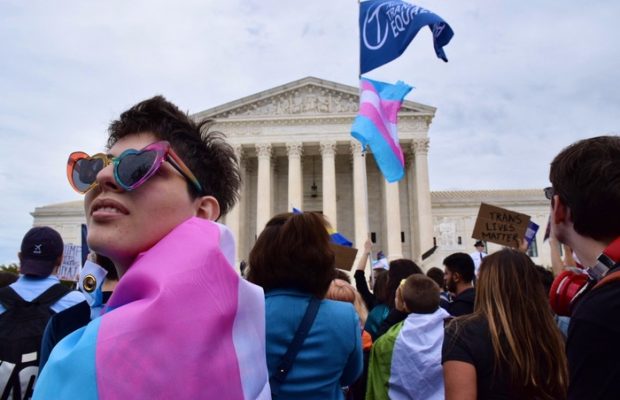Supreme Court Decision on Title VII Will be a Major Turning Point in LGBTQ History.

The U.S. Supreme Court heard three cases yesterday to determine if the sex discrimination ban in Title VII of the 1964 Civil Rights Act includes discrimination based on gender identity and sexual orientation. It is the most important case explicitly dealing with LGBTQ people ever to reach the U.S. Supreme Court, and it is the first time in U.S. history that a trans civil rights case was argued in front of the Supreme Court. While transgender attorneys and activists gathered inside the courtroom to defend their right to exist, hundreds of LGBTQ individuals and allies rallied outside of the courthouse to stand up for the rights of LGBTQ people everywhere.
The court heard the oral arguments for and against Donald Zarda, Gerald Bostock, and Aimee Stephens. Zarda was a skydiving instructor at Altitude Express in Long Island, New York, who was fired after telling a customer he was gay. Bostock claims he was fired after 10 years of working as a child welfare services coordinator in Georgia because he joined a gay softball league. Zarda and Bostock’s cases were consolidated to address the question of whether sex discrimination includes discrimination based on sexual orientation.
The last case was that of Aimee Stephens, a trans woman who worked as a funeral director for six years until she was fired in 2013. Stephens had written a letter to her employer explaining that she was transitioning, and the conservative Christian employer fired her, admitting multiple times that it was because Aimee is transgender and would not dress like a man.
The lawyers representing all three plaintiffs argued that discrimination against gay or trans employees violates the 1989 Title VII ruling in Price Waterhouse v. Hopkins that protects individuals who do not conform to gender stereotypes, such as women considered too masculine and men considered too feminine. Because trans people do not conform to societal standards on sex or gender, they should implicitly be included in Title VII protection.
The outcome of the court’s decisions in the cases of Altitude Express Inc. v. Zarda, Bostock v. Clayton County, and R.G. & G.R. Harris Funeral Homes v. Equal Employment Opportunity Commission could potentially rewrite Title VII and become the first federal law explicitly protecting LGBTQ individuals. Currently, only 21 states and Washington, D.C., Puerto Rico, and Guam prohibit workplace discrimination against LGBTQ people. This means that in more 50 percent of states, an individual can be fired or not hired because of their sexual orientation or gender identity. The unemployment rate for trans people is three times the national average, and 30 percent of trans people have been fired, denied a promotion, or experienced harassment at their jobs due to their trans identity. Unemployment can lead to homelessness, which can force individuals into risky industries and situations where they are even more susceptible to violence, abuse, and death. This year, 19 transgender people have been murdered in the U.S., and 18 were people of color.










